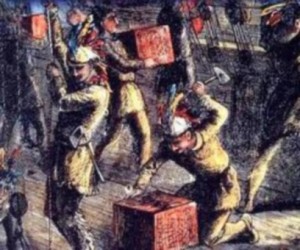On the Deficit, the Rich, and the Tea Party
 I’ve only recently come to realize the nature of the hurdle this country faces in trying to turn around a stalled economy and horrendous deficit. Here it is: liberal Democrat politicians have fully convinced huge numbers of people that our economic/fiscal mess is the result of two principal demons: 1) “the rich” and 2) the Tea Party. The former, of course, has been a longtime liberal scapegoat; the latter is a new one.
I’ve only recently come to realize the nature of the hurdle this country faces in trying to turn around a stalled economy and horrendous deficit. Here it is: liberal Democrat politicians have fully convinced huge numbers of people that our economic/fiscal mess is the result of two principal demons: 1) “the rich” and 2) the Tea Party. The former, of course, has been a longtime liberal scapegoat; the latter is a new one.
I’ve realized this painfully in the last few weeks as a result of several commentaries I’ve done (USA Today, FoxNews, among others), viewed by a large portion of Americans from across the political spectrum. In these commentaries, I tried to stick to statistics and facts. I naively thought my approach would be convincing. It was not, as evidenced by the many people I continue to argue with in emails.
Here today, I’ll reiterate the one fact that I thought was irrefutable:
As I noted in an article titled, “It’s the Spending, Stupid,” the federal government, from 1965-2009, never cut spending one single year. That’s right, not one time—nope, nada, nothing. To repeat: from 1965-2009, the federal government never decreased annual spending. To see the figures on a chart is eye-opening. The annual rise in spending has been a steady, non-stop, unbroken, upward climb for over 40 years. To the contrary, revenues to the federal government have gone up and down, the result—not of tax rates on “the rich,” but—of the status of the economy from year-to-year, especially during recessions. It’s both amazing and depressing to see that the federal government, unlike you and your family and your household and your business and your anything and everything else, is apparently incapable of adjusting (i.e., decreasing) its spending based on available revenues. It used to do so, under both Democrat and Republican presidents, but that changed in 1965, when the federal government, starting with the Great Society, began an outright spending addiction.
As I noted in the article, seeing this for yourself is as easy as Googling “historical tables deficit,” where one can view two sources: CBO historical tables (Congressional Budget Office)and OMB historical tables (Office of Management and Budget). These are the official sources for data on federal budgets. In the OMB link, look at Table 1.1, titled, “Summary of Receipts, Outlays, and Surpluses or Deficits: 1789-2016.”
In my articles and emails, I even included hyperlinks (as I have here) to these tables, imploring people to look for themselves rather than accept my word. And yet, I can’t begin to recount the angry emails I got from people insisting that the reasons for our deficits/debt is not over-spending by the federal government but greed by wealthy people who don’t pay “their fair share” of income taxes and by dastardly “racist” “terrorists” in the Tea Party. And, yes, I actually got emails (many of them) from people insisting that Tea Party members are “terrorists.” To observe an American public, only a decade removed from September 11, somehow equating Tea Party members with “terrorists” leaves me almost speechless and hopeless.
I will not bother responding to that particular smear, but I would like to address the charge that the rich are not paying “their fair share.” Again, I will stick to data.
If you Google the words “Who pays income tax?” you will find a chart (click here) from the National Taxpayers Union. It includes these telling statistics:
The top 1 percent of income earners pay 38 percent of all federal tax revenue. The top 5 percent pay 59 percent. The top 10 percent pay 70 percent. The top 25 percent pay 86 percent. The top 50 percent pay 97.3 percent. Conversely, the bottom 50 percent pay merely 2.7 percent of all federal tax revenue.
As the data shows, the rich are certainly paying their fair share. In fact, they pay the vast share. The poorest Americans, conversely, pay literally nothing in income taxes.
If anything, the system is disproportionately titled against the wealthy. Our “rich” are paying for the reckless behavior of politicians addicted to spending; they are subsidizing spending addicts. And to watch those addicts blame their mess on the rich for not paying enough? It’s downright obscene.
But the folks who have emailed me have the complete opposite opinion. It is an incorrect opinion.
Let me repeat: America’s deficit/debt problem is a spending problem. It is not the fault of rich people who pay too little income tax or Tea Party members guilty of “terrorism.” Don’t take my word for it. Look at the data.
My fear, however, is that the data just doesn’t matter to a huge number of followers of the party line. And that’s a very serious problem for this country, a giant propaganda hurdle that may be insurmountable.

